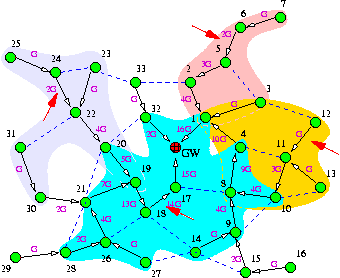
| Sponsor: | CACC |
| Period: | July 2002 - June 2003 |
| Student: | Jangeun Jun |
How much bandwidth do I get?. The answer for WMNs is:
It depends.More precisely it depends on the radio technology used (e.g. 11Mbps radio bandwidth for 802.11b), on the network topology, on how many users are sharing one Internet gateway, on how many hops away is the gateway, on what version of TCP the customers run, and on how good is the routing algorithm.

We tackled the problem of determining the exact capacity of a WMN. The key concept that we introduced to enable the calculation was the bottleneck collision domain[1,3] that is defined as the geographical area of the network that bounds from above the amount of data that can be transmitted in the network. We showed that for WMNs, the throughput of each node decreases as O(1/n), where n is the total number of nodes in the network. In contrast with most existing work on ad hoc network capacity, we do not limit our study to the asymptotic case. In particular, for a given topology and the set of active nodes, we provided exact upper-bounds on the throughput of any node.
In the process of calculating the nominal capacity, we assumed an
ideal fairness, i.e. fair allocation of bandwidth among all active
nodes. In reality, absolute fairness in a multihop wireless network
is very difficult to achieve, the system being inherently unfair. We
determined different strategies for restoring fairness and providing
different classes of quality of service [2] for wireless mesh
networks.
[1] Jangeun Jun and Mihail L. Sichitiu,
The Nominal Capacity of Wireless Mesh Networks
, in
Wireless Communications Magazine, October 2003.
[2] Jangeun Jun and Mihail L. Sichitiu, Fairness and QoS in Multihop
Wireless Networks
, in Proc. of the IEEE Vehicular Technology
Conference (VTC 2003), Orlando, FL, Oct. 6-9, 2003.
[3] Jangeun Jun "Capacity of Wireless Mesh Networks", MS Thesis Report, Dept. of Electrical and Computer Engineering, NC State University, Dec. 2002.
[4] Jangeun Jun, Pushkin Peddabachagari and Mihail Sichitiu,
Theoretical Maximum Throughput of IEEE 802.11 and its
Applications
, Proc. of the 2nd IEEE International Symposium
on Network Computing and Applications (NCA'03), Cambridge, MA,
April 16-18, 2003, pp. 249-256.